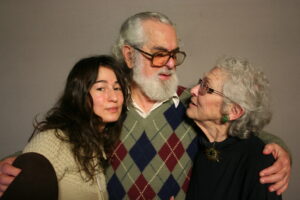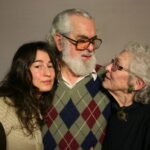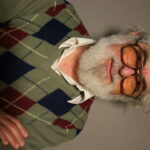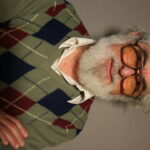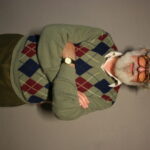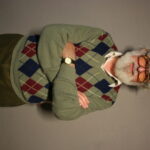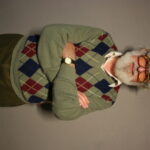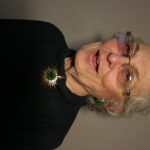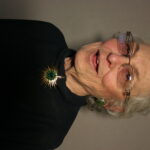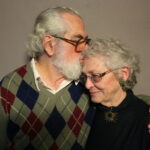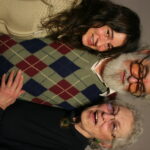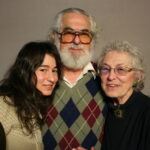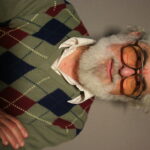Marian (Mitzi) Faye, Elliott Faye, and Poppy Gordon
Description
Mitzi (84) and Elliott Faye (83) talk to their granddaughter Poppy Gordon (29) about their family background. They then tell stories about their times living in Europe.Subject Log / Time Code
Participants
- Marian (Mitzi) Faye
- Elliott Faye
- Poppy Gordon
Recording Locations
StoryCorps Lower Manhattan BoothVenue / Recording Kit
Tier
Keywords
- Amsterdam
- anecdotes (humorous but true stories)
- Appearance
- Daimler-Benz
- dry cleaning
- europe
- expat
- family naming and nicknames
- family trips and excursions
- fig tree
- Germany
- GI Bill
- goat milk
- Israel
- Jaguar
- memories of former times
- memories of growing up
- Movies
- personal experiences
- Saratoga
- Saxophone
- Spouse
- travel
- Turkey
Transcript
StoryCorps uses Google Cloud Speech-to-Text and Natural Language API to provide machine-generated transcripts. Transcripts have not been checked for accuracy and may contain errors. Learn more about our FAQs through our Help Center or do not hesitate to get in touch with us if you have any questions.
00:06 Poppy i l Gordon 29 years old.
00:12 It is February 17th 2009 for New York City, and I'm the granddaughter.
00:26 Marion fee also known as Mitzi
00:32 Age 84
00:37 17th of February 2009
00:42 New York City at Foley Square
00:46 I'm the grandmother of Poppy.
00:53 Elliott Bay age 84 today the 17th of February
01:02 In New York
01:06 My relation to my partner, I think she's my wife.
01:11 Are the other one is my daughter.
01:17 Okay.
01:21 So I'm going to start off with a trick question here Mitzi.
01:28 Also known as Bobby to me, where you from.
01:34 I was born in Newport, Rhode Island.
01:38 I'm from New York, I guess.
01:43 What do you mean you guess well, because I've been so many other places that I don't know where I'm from but I feel most at home in New York City, okay.
01:56 Ellie also known to me as a t
01:59 Where you from?
02:01 Born here in New in New York
02:06 Traffic like like puppy to QuikTrip and then I'll be done to find out where I'm from.
02:18 Good cuz I don't know where I'm from me is making sure.
02:29 Bobby
02:35 Who are your parents and what did they do professionally?
02:39 How my parents my father was an able-bodied Seaman in the Navy in the u.s. Navy when I was born.
02:50 He then eventually moved on became a radio operator for the United States Coast Guard then entered the Weather Service of the United States Weather Service.
03:07 My mother was my father was born in Philadelphia. My mother was 6 months old when she arrived in the United States with her parents from Russia in Russia. They travelled out of Odessa to Braemar housing and sales from bremerhaven it to Philadelphia.
03:36 In 1900. So what was your dad's name? And what was her mother's name? My dad's name was Benjamin back over.
03:48 He had nine brothers and sisters all together.
03:53 His father was also a seaman who landed in the Philadelphia Port around the around the late 1880s or 1890s. Where was he from? Rumania or hungry? I'm not quite sure that I remember.
04:15 But I knew him when I was a child and what was your mother's name? My mother's name was Faye Luger. The name Luger was I could never find out what the original family name was in Russia for my grandfather. My mother's father because they had he had come from Georgia in Russia. And there was a pogrom and the family sent him out to go to school in Germany with a family named Luger when he returned to Russia via Egypt. He came into Russia under the name of Luger. So he was Morris Erin Luger.
04:58 And the how do you spell Morris Morris?
05:04 And the Aaron was a double a r o n e a t
05:13 Tell me.
05:16 Who are your parents and what did they do professionally?
05:22 I thought so very very big on that. My parents came in from from Poland.
05:31 I was I was the youngest of six boys and there's a 12-year difference between myself and the next youngest. So I must have been kind of an afterthought cuz I have very little memory.
05:49 Of family history
05:52 What was your mother's name for Friday in in your name? And her last name is have a middle name. What about your father? He was a tailor.
06:20 I always record on that. He has a talent he made a living for us cuz you know how I remember. I don't remember that. We we lived on a high plane, but I don't have any feeling that we lived on Ayanna on a low-level and what's his last name?
06:39 Fagenbaum was was a last name and one of my old of my oldest brother changed it to Fay when I went into the military at age 19. I went in as fagenbaum. So I was still carrying the name all the rest of the family with caring the name of Fae. And when did you decide to go to Fay instead of feigenbaum?
07:08 When I came out of the military, it just became more convenient since everybody was Faye for me to stop.
07:19 Do you ever Miss?
07:22 Being called fagenbaum
07:30 What does fagenbaum mean?
07:32 Faking faking would be
07:38 A butterfly yourself
07:43 You can speak on the microphone love you, but it was feigenbaum and fagin is a fig tree. So I guess that's answered your question. I hope
08:10 Bobby how and when did you meet Elliot?
08:16 Oh, that was a very long time ago.
08:24 I was up in Saratoga Springs with my girlfriend.
08:33 Do I really have to say all the circumstances sure do?
08:39 Oh, I don't most rather not.
08:47 The question was how where and when did you meet so you were up in Saratoga, Saratoga Springs New York going up there with my girlfriend and her family.
09:02 Primal ready to to work and the
09:09 I was it was the year that I turned 16 in December, but I was still 15.
09:17 And the Estates things didn't go very well with my girlfriend's family and I and I left and took another job and it was across the street from the house that his mother had as a boarding house and the
09:39 I saw him across the street on the balcony playing his saxophone. And what was your first impression of him?
09:50 He was so cute.
09:53 I heard he was pretty skinny. Yes. He was but still was like
10:01 She was not skinny.
10:05 Baby, what was what was the first time that you saw Bobby?
10:12 It's so difficult. I can't I can't pinpoint the first time. Well, did you see her seeing you play the saxophone to play the saxophone to be noticed. She was working in a house across the street and I noticed her, you know, she was a very noticeable younger woman and I noticed her across the street and I used to sit outside to where I lived and what I mean play the saxophone basically to attract her attention.
10:49 It worked didn't it?
10:55 So what was your first impression of of of bubby?
11:01 She was some Jim said Tokyo Beauty to Beauty long hair.
11:06 Lovely figure drifted around you on the air. It was a very romantic time for me.
11:16 K
11:19 So
11:23 How did it?
11:26 When you move back to Manhattan, I think it was from Saratoga.
11:33 How how did you deal with the distance Bobby?
11:40 Oh they did I didn't have to deal with distance in any way whatsoever. He had to deal with the distance. I didn't and end.
11:53 I had no idea what was going to happen.
11:58 Yeah, I remember that JD. I think you visited on the train, right? You took the you took the subway into Manhattan. Yeah, I lived in the in the Bronx and Bobby was down in the Rivington Street area of the of Manhattan and then we've had a great Summer Romance. I didn't want to give up on it when we came back from Saratoga, which was basically I was summer school vacation. I would visit her every every weekend and then I had a job. I got a job at downtown on on 8th Street and that made it so much easier to going after the job to go down to where she was living on Rivington Street.
13:00 Now I remember something and I'm not sure if it's accurate. I remember that somehow the fair went up on the subway. I can't remember what that was. But I think I think you told me that you paid his fare once or twice for him to visit. You know, what happened to say or didn't go up. I think he lost his job and didn't have any money. So I think I gave him $0.20 for a round trip ticket, you know round trip. It was a nickel and $0.02 for transfer was the turning point. I think so because I was hard earn money.
13:41 Mount school, so when do you think was the next turning point in your relationship? I guess when he turned 18 and finished high school. The war was was was on it started in 41 and 43. He joined the airforce.
14:06 And the it was a very difficult time for everyone to go through. I mean everyone knew there was a war that was
14:19 Just everywhere was rationing and all kinds of uncertainties and
14:26 I think that was a turning point and also the fact that he had two brothers that were already in service and he know the third son to go. How did that Turning Point affect a relationship though?
14:40 I don't think it affected our relationship at all. I think our relationship when we're in Saratoga was was for our age. We were both 16 was as intensive 16 year old relationships kid and it continued because I continued for a year after that traveling every weekend down to the Seahawks and the towards just before the war got to a point where her mother didn't see anything strange in that I would stay weekends, you know at their apartment and then I went into the military when I was Nineteen by that time it relationship was very intense.
15:25 So there's a there's some weird business in our family and some very conflicting information that gets passed down here where you guys ever married or not. Yes. We were married because yes, we were married December 31st 1943 by a Justice of the Peace.
15:51 I had traveled from New York to St. Louis. He was stationed at Scott Field, Illinois at the air base.
16:01 And we were married. The only conflict between that is that he was under age to be married in Missouri man. Had to be 21 and he was
16:20 Not yet 19.
16:25 He is but he would have been 19 the following April because I'm 4 months older than he so did you ever feel like you were robbing the cradle there?
16:37 No, he just did never seem that young. I don't think we ever thought of ourselves.
16:44 Young's it was no such a category like teenager you were a child and then you're an adult you are the one the school you went to work. There was no separate category of a buying entity called teenager.
17:08 Okay, so
17:12 How did all this traveling business start?
17:20 Front of me traveling to visit her to know I mean, basically I think your family had a business in in in the dry cleaning business or something and you are both here in New York. And then I had that store on DeKalb and Knickerbocker. Yeah. How come you didn't just stick with that? How come you didn't just stay in New York and continuing on the dry cleaning stuff will because
17:55 It was it was not a satisfactory situation. Personalities.
18:03 Is there an adventurous couple always on the move and we decided it all these memories are very vague now, you know this or not, but I remember we we we decided that to be a middle-class family was was not what we were looking for and
18:31 Play Rico. We just felt we we didn't want a middle-class life that we took off for Europe and I'm off in time. So how old were both of you when you first decided to leave New York for the first time. And where did you go is the we lived in the city and you have to kind of backtrack because when he got out of the service use the GI Bill and went up to the Yale extension school to study photography.
19:04 So because that's what he wanted to do and over the next course of a few years because we had our first child he worked in photography, but it was a very very hard go and there was a conflict of being a with a family and living the life that that would have been necessary in order for his career to go into into that into that made you so to speak so he'd eat weed start and then fall back because it was never enough money and fell. When did you go to Europe for the first time will that was long afterwards because
19:55 Just one day I could not stand being in the dry cleaning store anymore and said that if I if I got a job in New York, and then that would be it now we have to sell the business and do something else and I got the job within a few hours as a yes Sketcher for address house on 7th Avenue.
20:25 And the
20:27 And I still haven't gotten my answer. And so then he sold the business and he went into the insurance business as a way of making money and supporting a family and that's what he did that took us into New Jersey will be open to an agency and and the your mother and Allura in Frederick went to school in New Jersey and the again the the the insurance business had had
20:59 Done very well for us, you know financially that was fine, but we went to a party and someone had just come back from Europe with his family and said how wonderful it was to what to sell insurance to the military in Europe. It was just fabulous. So I urged him to apply and he did and the he was a fantastic salesman. We lived in Europe and travels and and it was a very heady Xavier. He still taking photographs and he took photograph all the time.
21:45 At the time at the time there was a big American Military presence in Europe and the government made it very very comfortable for American citizens to work in Europe. I mean, for example for an American at that time working in Europe is first them or their first $25,000 of income was totally tax rate and the European economy was such that at that are a dollar was just a wonderful thing to have in your pocket because it was like when you were up a well-to-do person so young. So how many places did you actually end up traveling to can could you name them all? Oh shoot. Okay, we can we were stationed in Germany that we went to England Italy France, Austria, Spain Greece Malta Cypress.
22:46 And then we eventually went to Israel.
22:49 Okay, so
22:52 How how was it being a Jewish American Travelers in Europe during that time. Did it did did you feel like you were just right at home, or was it weird?
23:08 For us for us it was Wisconsin because we had that kind of of of inner Spirit than internet that appreciated in new experience and the dollar was totally the king if you had a dollar in your pocket. I mean you you will just could go anywhere and do anything. I think we were paying $0.25 a gallon for gasoline. We were driving around in a in a really nice car through American. We had a Mercedes-Benz. Where were your daughters? Were they in the car? Yes to younger ones.
23:56 When we first came to Europe we started out in a little Volkswagen convertible, but I would say within maybe three or four months you able to if you had any sort of ability in that atmosphere you able to earn so much that your whole scale of living with just jump right up and there was no pressure on us to work everyday. I remember I think that I was only working maybe three maybe four days a week and we would take long long weekends off all weekend Fred was already out of the house cuz she was older but we take Lauren Allison and we drive to Amsterdam. We drive to Amsterdam to go to the movies because in Germany, they dubbed everything and we got tired of of the movie so we would take them over the weekend and go to movies and because they did they did the
24:56 English so it was not unusual for us to run to just take a long weekend. You could drive to Italy you could drive to Austria. You could drive to France at that time. We we never went through of Berlin because of the the problems because of the work permit with the with you work with the military. So I want each of you to think of the the you get one story your weirdest memory your weirdest travel memory.
25:35 The weirdest travel when you mean weird, what's what exactly do you mean what I mean goat's milk weird goat's milk with I'm okay. I'll do the goat's milk story and you can think of what you want. Okay, but this was long after that the children were gone. Alison was still living at home and we had already moved to Israel. He got a commission to do a book on Saint Paul's Ministry, and we ended up in the mountains of Turkey.
26:13 Because Paul traveled through that area and we had to travel in the footsteps of st. Paul which was the name of the book.
26:22 So we end up in this mountain top place and stop see you then. We had bought a Dutch male van and sit it out. So we could sleep and eat in the van and we're by the way roadside in this group of children comes along with an older child and they beg us to come into the into the compound where the houses where we go in and the they greet us and we were able to converse because at that time many of the Turkish young men had gone to Germany to work and then they would come back with their earnings because that's support these are very poor families and this particular group on the Mountainside were Christian not Muslim and so language was was was fine because
27:22 I spoke German quite well at that time. So there's some your grandfather and your mother and we are invited into this actually beautiful place and sit in this cool Stone tiled room and the women bring these big silver trays with these tall tall glasses of this white liquid and it's a sprinkled with nutmeg and I know that it's milk and
27:57 Your grandfather hates milk. So immediately he sees this he excused himself to get something out of the van. Your mother says, oh, I don't feel very well. I'll be right back and I was left with three Tall Glasses. Very very tall glasses of milk Raw.
28:24 Raw goat's milk now. You had to understand that there was no way no way in the world that such Hospitality could have been refused under any circumstances. So I drank the three glasses of goat's milk.
28:48 And I suffered for the following week.
28:52 White miserably
28:56 But they really were very hard-hearted because they didn't feel bad about having not drunk the goat's milk.
29:08 Give anything to say for yourself, baby.
29:11 I know that everything out of my memory of that. I was at that condo that we were living in Israel and I was working for an Israeli publisher who is doing a book on the life of a of a St. Paul and I was in Turkey in Turkey. It was you that they sent that I want the site related to st. Paul that I wanted a photograph. So I went to the authorities to find out where is where is the site?
29:57 And they told me that at the site was on top of a not what you call a mountain but what with your clothes I really I feel that they didn't come over the mountains. I called in a mountain and I asked a permission just about everything I had to do that that time required some sort of permission from the Turkish government and I asked for permission to to go to the site. They said we'll come back come back tomorrow and we'll we'll take you up. Well, I came back the next day with my my camera equipment and it was with just what I could carry and what do I find but a bulldozer small army of men all the equipment ready to bulldoze a hill.
30:53 Up to the site it was with my vehicle because there was no way to get up to the site unless you really create a road and we bulldoze the road right up to the site and when I when I got to the particular site, which was a village already there were people up there that had never that had never when you were with me the people that had never
31:18 See the European and it it was an experience living in this Village of people who would never seen use the word Caucasian cuz but I I would send you had never seen a real.
31:36 Is that where they were banging on the on the they were banging that they came running up to the car and they were banging on the car was that it was a different thing is why it was strange is have to understand that he had a full beard at that time also, but it was not great with black and they they could not understand why.
32:00 Such a young man would have a full beard and a mustache inter-religious strong religious identity. And why was he traveling with two women? So I had to explain that we were taking this to order because your mother was with us as that the everything that we had was the betrothal things and that the date they wouldn't touch it or anything and had great respect for the idea that that this is what we would doing. What were you what's a betrothal? I don't understand her husband-to-be. I mean this was the custom the parents took the daughter to the to the to the
32:59 Future husband's family and Gifts of that would be her Dowry and so everything that we had this way. We explain why we were doing what we were doing because they were no words to explain to them what it was that we were doing just taking pictures how kind so but just to get it straight. There was no wedding. There was a wedding making sure they accepted the X exclamation and that was all right because you had to be aware of the customs of the people that you were with and how old was my mother when you were offering her up for a betrothal of presumably how old was she
33:59 End of a vivid memory of bulldozing that road make it completely bulldozing the road up to the top of the
34:10 If it was not the right word mountain is closer. That's the reason I had to be up there because he was photographing the the journeys of st. Paul.
34:29 So at that time it was a Christian Enclave, but then it became Muslim and you would see the other stones of the
34:41 I'll see your faces of the carvings of these has the Saints and things like that with the eyes gouged out that way uses big building blocks afterwards. What was unique about it. I remember is that it was a Christian Community in a Muslim area that had no relationships with other Christian communities whatsoever. It was a totally isolated Christian Community time and they they treated us very well on your but they were Muslim. They were Muslim. He said he was with the men overnight and Allison and I were with the women
35:20 Were they Muslim or Christian or Muslim but the village originally had been Christian. That's why the stones that's why you didn't know it wasn't that's why you had to be up there to photograph the artificial the show that when Paul came through. He said a church up there.
35:44 I remember something at some kind of a goodnight story that you used to tell me that involved a mountain and it had different layers on it and it was so severe that was one of the other trips that we took and we went on vacation. We had bought a headboard a big Mercedes and we attach the camper to it and traveled across you just loving Alps and we were way way high up in the mountains and
36:18 At that time Tita was in the government and the it was very primitive up in the mountains and what they didn't it at night at night somebody at the very very top had the means to make a fire and they would make Embers charcoal Embers and they would then throw it down to the next level in the next level would make a fire from the until it went all the way down. And I had I had known about that because somebody had told me what you could Bobby was like someone be started out. We bought two things. We bought boxes and boxes of wooden matches and boxes and boxes of cigars.
37:07 Okay, not cigarettes cigars and this way whenever we were stopped we give boxes of matches a box of matches and a cigar to the Head shape if there was one or the the head-to-head mail the policeman or the policeman.
37:31 And that's how we made our way through but we saw this the Deliverance of the of the fire because we had to camp overnight and watched it happen. It was extraordinary how they did that. So giving a box of us kitchen wooden matches was a big luxury.
37:55 Do you mind if I ask one question go for it? What do you think prepared you both of you for being able to think on your feet in these strange situations?
38:05 Your personality if you write a congruence, it's nothing in the way of any formal presentation.
38:14 We we we didn't know we didn't know to be afraid.
38:21 We always when he was doing Insurance, most of the American families would never go on the economy. They would stay within the military consigns and have everything familiar. I worked for a while for the military so had access to a you know, all of the benefits of the military, but we always lived on the economy the the children had access to different foods that we met people people was so friendly they invited us into their houses we exchange pictures and and it was so pretty. I don't think we ever had a big fat except for one time. We were parked in a parking lot and a new parking lot in in what was supposed to be according to the guide books?
39:21 A resort. It is seems a Glide what book was printed, but the resort hadn't been built yet. So he went photographing and the next thing I know is I said, he's being brought back in the police car with two or three policemen and he wants to all of our passports and everything. They take him away because it seems that he had wandered into a very restricted military area. I was photographing the landscape.
39:53 So when he finally the one the police saw that that you know, it was all a terrible mistake. Everything was fine. But that that that that was a kind of a and if he can defeat time.
40:12 Rossetti beat somebody up on a beach on a beach but that was an Israel. Why were you beating a well that was another thing he was photographing them. There was a at the end of the range hood Village. There was athlete which it has a thirteenth-century pilgrims. It's it was it was the one point with this fruit from the Third Crusade was the one point where they could land between the two Muslim arms wanted. Alkalyn the other job, Okay, so they landed in this Harbor
41:01 And within able to rest and Equipment go on to Jerusalem and it became a military installation as well as the Nature Reserve because because it was a very hidden Harbor there were the things in the in in the water that had never been Disturbed or or altered and so it was essentially a military thing cuz they they they trained submarines. So he wanted a photograph castle and at that time we had coming to Israel with the jaguar and just before that. There was an Englishman who had a Jaguar who turned out to be a spy.
41:49 Okay, so when he comes down we come down with the Jaguar we had this Doberman Pinscher dog, and and he begins photographing all the sudden from the sink coming in these these two guys on these little skips this standing up and they're pointing guns and they say, you know giving your camera.
42:12 And he does know who they are. He thinks there their they're ours and they want to take his his like his and he's not about to give them up. So there was a scuffle and taken into the young. It's the military headquarters. We explain who we are and where we are then they drive up with two ain't hard and they look at all of his photographs and don't mess with ladies like us that was seized was full and Ventures, you know, I just want to ask you a couple of really quick questions, but they're kind of big so, okay, whatevs. What would you guys have to say if you had three words to tell me what your guiding principles were in which informed the way in which you decided to live your life three words.
43:08 Can consistent I guess?
43:17 K3 words not knowing anything
43:24 I this is what you leave me with not knowing anything and just letting everything go today. Just let it go is an art of anything. That's what I wanted to say. You're difficult to do three words, and that's what we did. Okay, so next question.
43:48 How are things different now?
43:50 Better or worse
43:54 The difference because we're 84 and in my head I could still do those things, but the rest of me knows that that's not possible.
44:06 What about you? Nothing of the fact, I think that our experience has first of all enriched and cemented our relationship which is which is very important to me through so both of you really quickly name one thing you love about each other and one thing that really annoys you what I love about him. He's so cute.
44:34 What annoys me about him?
44:37 What annoys me about him?
44:44 A lots of things but nothing to talk about really.
44:49 What about you special? I just I just love your grandmother and doesn't need any reasoning for me.
45:01 You never want to throw out the window throw out the window huerter, not of any consequences young the kind of world that everybody has.
45:18 I hope I have no complaints about her if I had to do it over again. Maybe I'd hesitate but I do it over again.
45:30 Great place to leave it.
45:33 Wow.
